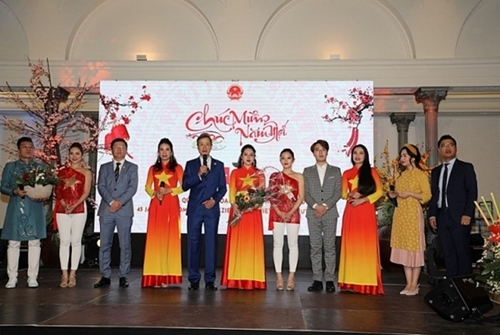Only a few Vietnamese people can be spotted at international airports in the country. Meanwhile, in previous years, as Tet was coming near, Vietnamese people lined up at airports, waiting three to four hours for flights.
In an article sent to the People’s Army Newspaper, PhD Nguyen Canh Nhu wrote about what Vietnamese expatriates in Germany were doing to celebrate Tet as they cannot fly home to enjoy a happy Tet in their motherland this year.
    |
 |
|
At a program to welcome the lunar New Year 2020 in Berlin, Germany. Photo: Nguyen Canh |
According to the Vietnamese intellectual, in the weeks leading up to Tet, Vietnamese trade centers in such big German cities as Berlin, Leipzig, Dresden, and Hamburg were crowded and people could feel the Tet spirit. Vietnamese locals were buying Vietnamese jams, candies, and ingredients for Chung cake. People could also buy already-boiled Chung and tet (cylindric glutinous rice cakes) cakes at Asian people-run shops. Roosters, branches of peach and kumquat, and pickled onion were also available in pavilions.
“During Vietnamese Tet, Vietnamese people still have to go to work. Therefore, after work, they spend time wrapping chung cakes, cleaning up, and decorating their ancestors-worship altars to welcome the lunar New Year holiday,” Nhu wrote.
He added that in the afternoon of New Year’s Eve, Vietnamese families rushed to a restaurant in the Dong Xuan trade center in Berlin, where the Vietnamese embassy in Germany hosted a Tet program. During this program, the participants tasted traditional Vietnamese dishes and enjoyed artistic programs in which sometimes domestic artists performed.
PhD Nhu shared that where his family lives there are 14 other Vietnamese families. They often gather on weekends or on festive days. Apart from some returning home for Tet holidays, the remaining families enjoy Tet together.
He recalled that seven to eight years ago, the Lunar New Year fell on the weekend, therefore, families sat together late at night, chatting and recalling their unforgettable memories of Tet in their motherland.
In the article, Nhu also wrote that before Tet, Vietnamese families in Germany maintained the tradition of worshipping the “Ong Cong - Ong Tao” (Land Genie and Kitchen Gods) on the 22nd or 23rd day of the last lunar month of the year. When watching clips of Vietnamese people releasing carps into lakes and rivers, German people hailed the Vietnamese noble tradition.
According to Nhu, on the first day or the fifteenth day of the lunar New Year, Vietnamese people often visit pagodas which are built under the auspices of Vietnamese people.
“Vietnamese people have lived in Germany for dozens of years now. Germans consider them foreigners who have integrated into Germany well thanks to their industriousness and Vietnamese students’ thirst for knowledge,” Nhu wrote. He added that Vietnamese children, regardless of their birthplaces, are fluent in Vietnamese and blend well into Vietnamese and German cultures.
“There are about 170,000 Vietnamese in Germany. They are always turning their hearts to their roots. That is vividly demonstrated via their Tet-welcoming program,” Nhu concluded his article.
Translated by Mai Huong